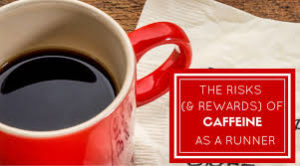 In 2004 the World Anti-Doping Agency lifted the ban on caffeine for performance, but as I write this WADA are considering whether to move it back to being a prohibited substance.
In 2004 the World Anti-Doping Agency lifted the ban on caffeine for performance, but as I write this WADA are considering whether to move it back to being a prohibited substance.
In the following article I’ll be discussing the pros and cons of using caffeine in sport and how to utilise it in running for maximum effect.
The pros
Within 30 minutes to 2 hours of consuming caffeine, the performance-enhancing benefits of note are;
- Improved concentration
- Reduced fatigue
- Enhanced alertness
- Increased time to exhaustion
- Improved muscle contraction
I’ve certainly felt a marked difference in my performance during running when consuming caffeine 30 minutes to 1 hour before I start and I can generally run for longer and faster if I ensure I drink plenty of water at the same time. If I don’t I get headaches and a frequent urge to drink water which ultimately affects my performance.
Caffeine is effective and safe in smaller doses if taken carefully and it poses far less long-term risk than prohibited drugs such as steroids and blood-doping chemicals. There are also many studies to show that drinking coffee can reduce your risk of acute and chronic neurological disorders such as Alzheimer’s, dementia and cardiovascular disease.
The cons
The downside of caffeine generally comes into play with larger doses. It can have a detrimental effect on some aspects of performance, for example, fine motor control and technique due to over-arousal.
Other side effects with larger volumes of caffeine include;
- Palpitations
- Increased muscle tension
- Headaches
- High blood pressure
- Interference with recovery and sleep patterns
- Restlessness, anxiety and irritability
- Abdominal pain
- Diarrhoea
- Dehydration
Without a ban in place, caffeine can be abused and the consumer may suffer any of the above symptoms. Combined with high intensity exercise, an increase in blood pressure and heart palpitations from caffeine, puts the body under tremendous strain.
It can be very tricky to get the balance right between hydration, caffeine level and electrolyte balance whilst sweating. Since caffeine increases your heart rate, you sweat more and if you’re training in hot weather this balance is complicated further.
How to use caffeine effectively
Caffeine affects everyone differently. Athletes fine-tune their doses and timing in training before using caffeine during competition to ensure they can tolerate the amount they’ve decided to consume.
In the 1980’s experts thought only high doses of caffeine would give performance-enhancing effects but it has now been proven that much lower doses, between 2-4 cups of coffee (200-400mg) are very effective.
Caffeine enters the bloodstream faster in the absence of milk or other food and so my personal prescription would be a double espresso or black americano (200mg) on an empty stomach with an accompanying large glass of water, 30-60 minutes before running.
If you have a higher tolerance you could try doubling this, reaching a maximum of 400mg pre workout and ensuring you drink plenty of water to counteract any dehydrating effects.
This works well for running sessions lasting 60 minutes or less. For longer runs, a pre workout meal 2-3 hours before and then caffeine 30 minutes before would enable better performance.
Don’t expect a miracle though! It’s no substitute for proper training, equipment, nutrition and hydration so try experimenting with caffeine to boost an already strong base of fitness.
Caffeine alternatives to boost energy
Despite existing for quite some time, the following energy boosters have been long overlooked for the following reason; we’ve believed that an energy booster must be exclusively a drink or a pill.
- Hydration. Just 1% dehydration is enough to affect performance drastically. Ensure you drink plenty of water before, during and after running to keep your energy high.
- Sleep. This is a no brainer. Coffee used to prop up a sleep deficit often fails, leaving you feeling much worse as the effect wears off. Get 7-9 hours sleep every night if you’re training regularly.
- Choose slow release carbohydrates such as whole grains and sweet potatoes over refined carbohydrates such as white bread and sugar, to keep your blood sugar level even and your energy stable.
- Eat regularly. Eating little and often keeps your energy levels topped up and the load on your digestive system smaller.
- Stress. Take steps to keep your stress level in check. Caffeine can drain you even more if you’re already stressed which can lead to adrenal exhaustion.
Did you know?
You can make a natural energy shot by juicing 2 apples and a 1 inch piece of fresh, peeled ginger. The combination of fruit sugar and the kick of the spice get your blood pumping and awaken your senses. Try it instead of coffee one day and if you haven’t got time Pret make a fresh one daily called ‘Ginger shot’.


